Well, the Santa Clara Valley Chapter of the California Native Plant Society has such a friend. His name is Ken Himes, and aside from being a botanical maestro, he's a fellow with CNPS, and lifelong protector and practitioner of native plantology. And this last Sunday, I, and a fun group of CNPSers, got the pleasure of joining him for a hike on San Bruno Mountain.
Ken sure didn't disappoint in his choice of timing for the guided hike too. Not only were there over 50 species of California natives already blooming (muchas gracias El Niño tambien), he somehow Nostradamused into 1 of the approximately 14-1/2 days per year when San Bruno Mountain isn't completely shrouded in clouds or fog or bone-biting winds. Amazing.
Why San Bruno Mountain? Much like Edgewood Park, that I adore and visit often (and that Ken Himes leads the weed warriors within), San Bruno Mountain has interesting geology that includes fault zones, exposed serpentine rock, and thin soils (as well as those non-geologic winds and fogs). And thus, as seems to be true of many isolated serpentine areas (e.g., Edgewood, Ring Mountain Preserve...), there's also interesting and unique California native plants living there. In fact, several of the species we saw only grow on the mountain, and no where else.
Now on to the story that the mountain and Ken had to tell us that beautiful Sunday...

Ken starts his tale on the mountain top. San Bruno Mountain is actually a state and county park - lands are owned by both (as is management too I'll bet - fun!)

The rare, endangered San Francisco Wallflower, Erysimum franciscanum, is reason enough alone to make the pilgrimage
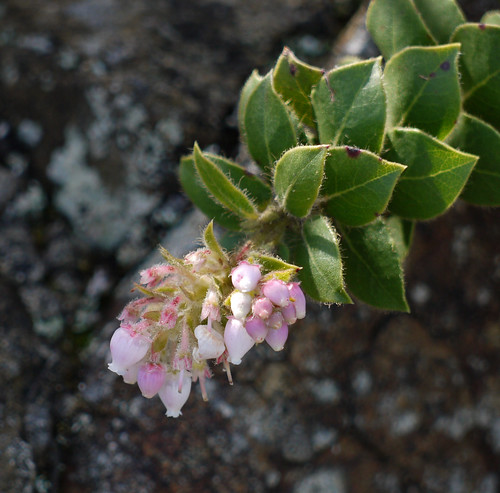
But there's also the endangered San Bruno Mountain Manzanita, Arctostaphylos imbricata!
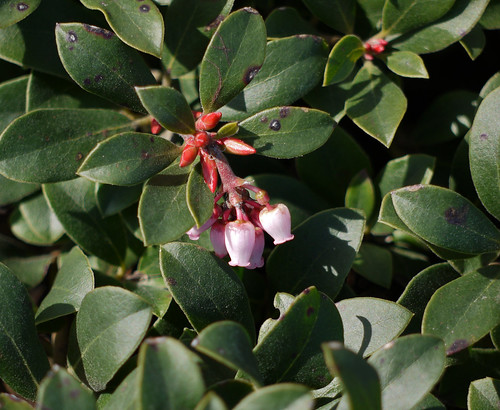
And while not endangered, the big, sprawling carpets of Bear Berry Manzanita, Actostaphylos uva ursi, are really lovely too
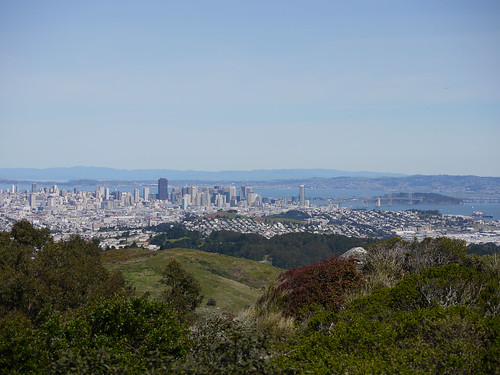
And the views aren't bad either - at least on a clear day... If you go, bring lots of layers, hats, gloves, windbreakers and warm stuff - it can be really foggy and windy
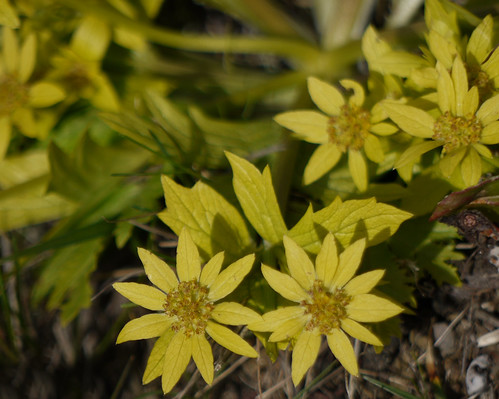
Footsteps of Spring, Sanicula arctopoides, are common along the trails - at a distance seeming like someone sprayed blasts of yellow paint here and there, but up close looking like little yellow Poinsettias
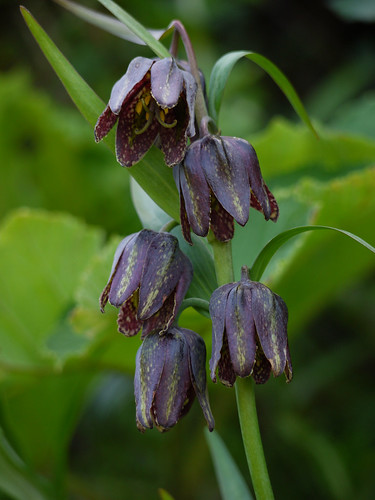
Surprisingly, Mission Bells, Fritillaria affinis, grow all over the mountain - in the shade, and even out in the "sun" (but 90% of the time there is no sun - just fog or clouds). This tall, dark beauty was right next to the trail in the chaparral, while other shorty bells hide in the grass in the windswept fields
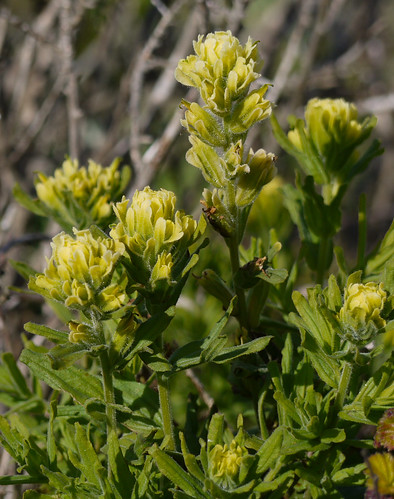
Wight's Paintbrush, Castilleja wightii, likes the chaparral too and can
be seen in yellow, orange and maybe red
And while the mountain and trails are mostly exposed, there are some ups-and-downs through riparian gullies with trees, tall shrubs, and some shade-loving wildflowers...

The gang stops for a trailside lesson - Ken's voice carries, but botanists (and
botan-wise-ists) in the CNPS group also nicely make sure everyone hears the details
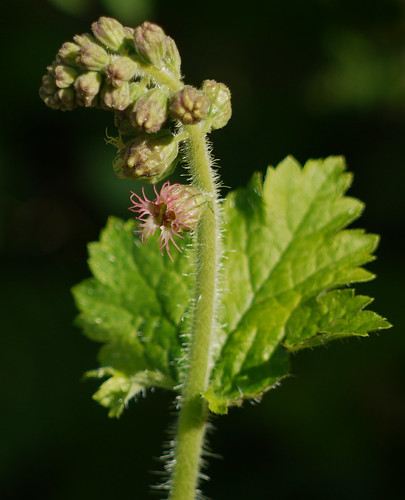
Fringe Cups, Tellima grandiflora, enjoy the wet areas

Bright Douglas Iris', Iris douglasiana, hide under the chaparral in large patches
Down by Fern Rock we stopped to learn fern ID methods (of course), and ooow and aaaaw over some low-growing beauties on the hillside...
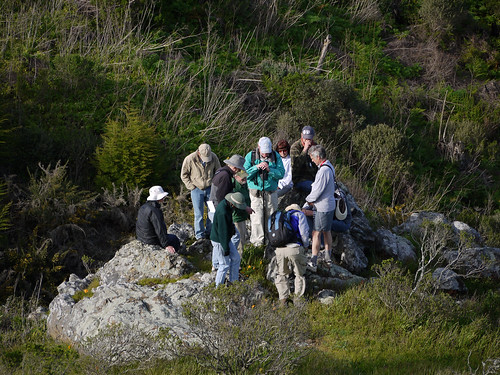
Ken tutors fern ID on Fern Rock

Blue Larkspurs, Delphinium decorum, hide in the grasses near Fern Rock
And even though the Sun was setting, a few of us also did a short, chilly apres-hike hike into a little canyon that hides some more San Bruno Mountain natives. The add-on was fruitful - we saw these 3 pretties that aren't all that common around our way...

Hummingbird Sage, Salvia spathacea, lives in the canyon

Another iris does too - Iris longipetala - the Coast Iris

And we also found delicate California Fairy Poppies, Meconella californica, hiding in the dense growth to end the day.
==
But wait - there's more!
Here's a final collage of some of the other wonderful Cal natives we saw blooming that day:
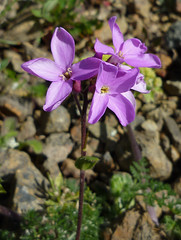

Coast Rockcress, Arabis blepharophylla, and Indian Paintbrush, Castilleja sp.

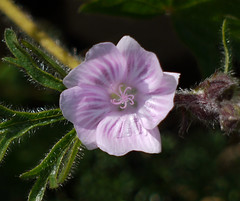
Meadow Chickweed, Cerastium arvense, and Checker Mallow, Sidalcea malvaeflora
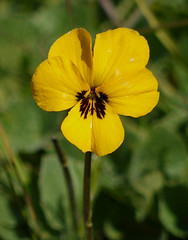
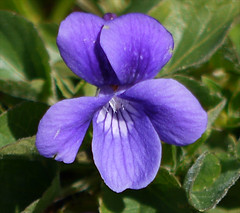
Johnny Jump Ups, Viola pedunculata, and Dog Violets, Viola adunca

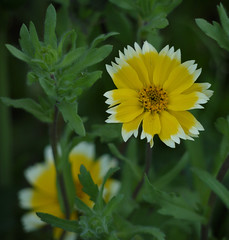
Johnny Tuck, Triphysaria eriantha var. rosea, and Tidy Tips, Layia platyglossa


Bee plant, Scrophularia californica, and California Phacelia, Phacelia californica

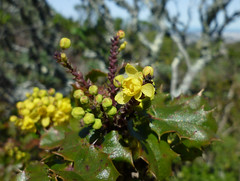
Red Elderberry, Sambucus racemosa, and Barberry, Berberis pinnata
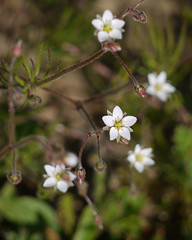

Spurry (probably Spegularia macrotheca), and Slender Phlox, Phlox gracilis
====
References:
- Santa Clara Valley Chapter of California Native Plant Society
- County of San Mateo - San Bruno Mountain State & County Park
- State of California - San Bruno Mountain State Park
- Bay Area Hiker - San Bruno Mountain State and County Park
- Wikipedia - San Bruno Mountain State Park
- Wikipedia - El Nino

Beautiful collection of pictures. Some are familiar, others not. I guess that makes sense, geographically speaking. I like the view from the top of San Bruno Mt. I can see where my house was from there (near the Albany Hill in the East Bay).
ReplyDeleteThe Vancouver naturalist community also has a Ken. These folks are invaluable.
Happy spring,
Hugh
What a wonderful wildflower trip...thanks for letting me tag along electronically. Al
ReplyDeleteHi, we visited San Bruno Mountain on Sunday, March 21, just days after your visit. What a great collection of flowers. You were lucky to have such a knowledgeable guide. I took photos of many flowers you didn't display. Could I send some of them to be added to his gallery? If so, how? Thanks!
ReplyDeleteThanks all for your lovely comments. Glad you liked the hike.
ReplyDeleteMarilyn - I too have many photos of flowers I didn't include - this was just the set I wanted to show with the story. I appreciate your offer for the photos though.
-Ken
Awesome! I hiked this mountain before they built the condos (what a crime!). Beautiful photos.
ReplyDeleteSuzanne
Thanks Suzanne for your kind words about this and my Edgewood post!
ReplyDeleteSpectacular. Your photos really make me homesick for northern California.
ReplyDelete